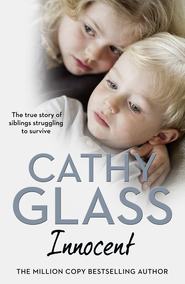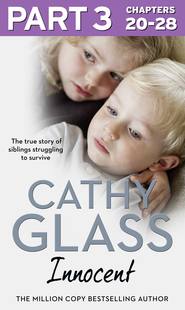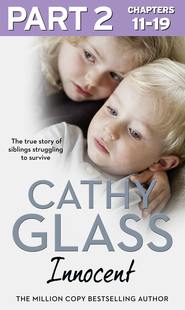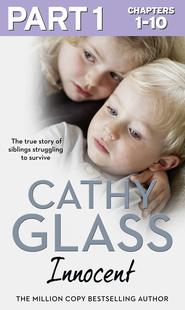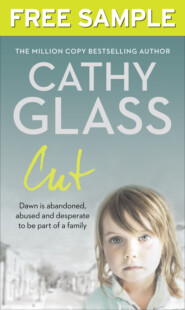По всем вопросам обращайтесь на: info@litportal.ru
(©) 2003-2024.
✖
Cruel to Be Kind: Part 1 of 3: Saying no can save a child’s life
Настройки чтения
Размер шрифта
Высота строк
Поля
‘This evening?’ I asked, aware that it would be late and Max would already be very unsettled.
‘Yes.’
‘And you want him to go to school tomorrow?’ I needed to know so I could make arrangements to take him.
‘I don’t see why not. I’ll let you know the name and address of his school and the other information you’ll need when I see you later.’
‘OK. Thank you.’
We said goodbye.
It was now 2 p.m. and I went straight upstairs. I’d been fostering long enough to have accumulated spare clothes for emergency use for children of most ages. Sometimes I had plenty of notice when a child was being brought into care and could prepare for their needs, even meet the child if it was a planned move, but many children just arrived – as Max was going to – with very little notice.
I went first to the airing cupboard where I took out a fresh set of towels, and then continued into my bedroom and to the ottoman where I kept the spare clothes. Lifting the lid, I rummaged through until I found pyjamas, socks and pants for a six-year-old. I didn’t have any spare school uniforms so I’d have to wash and dry what Max was wearing. From a drawer in my room I also took out a child’s toothbrush and hairbrush. I put the towel and toothbrush in the bathroom, ready for later, and then carried the clothes into what would shortly be Max’s bedroom. I’d already thoroughly cleaned and vacuumed it and put on fresh bed linen after the last child had gone. Since Alex (whose story I tell in Nobody’s Son) had left two weeks previously, I’d looked after a child on respite for ten days who’d now returned to live with his carer.
Satisfied I was as prepared as I could be at such short notice, I returned downstairs to telephone Jill, my supervising social worker from Homefinders, the agency I fostered for. Jill’s role was to supervise, monitor and support me in fostering so that the child received the best possible care. She had telephoned me an hour before to say that Max was being brought into care and to ask if I could look after him. Although she’d asked me, it is generally assumed that a foster carer will accept the child referred to them. It’s not a pick-and-choose situation. The child coming into care needs a home, so unless there is a very good reason why a carer can’t take a particular child then they are expected to do so. From the little I knew, I was happy to accept Max and had no reservations. Jill had given me a brief outline of his home situation and why he was now coming into care. Although Max hadn’t been in care before, his family had come to the attention of the social services when some support had been put in, and now, while Max’s mother was in hospital, his three teenage sisters were supposed to be looking after him, but last night they’d gone out partying instead. A neighbour had alerted the social services when Max had knocked at her door asking for dinner and she’d taken him in. I also knew from Jill that Max was being brought into care under Section 20 (of the Children’s Act), also known as Accommodated. This is when parents ‘agree’ to place their child in care voluntarily, rather than going to court and risking a care order, which would mean they would lose their parental rights. Around 30 per cent of children who come into care are placed under Section 20. Jill had said she was hoping to be with me when Max arrived, and I now phoned her to let her know the time.
‘OK, see you later,’ she said.
I began a quick tidy-up of the living room and also took food from the freezer for dinner later. I knew from experience that when a child first arrived with their social worker there was a lot to get through, and also Jo was expecting me to take Max to visit his mother in hospital, so time would be short.
Adrian, my seven-year-old son, would be pleased to have another boy staying with us, I mused as I worked, although in truth he and my three-year-old daughter, Paula, usually got along with any child we looked after. They’d grown up with fostering, so having someone else living with us was the norm. Also the norm, although it saddens me to say so, was that I was now a single parent, as my husband, John, had left us eighteen months before. I’d taken a short break immediately after he’d gone and then a few months later, with the children’s agreement, I’d resumed fostering. I enjoyed fostering – caring for and helping the children while they were with me. It gave another dimension to my life and the small payment I received, together with the part-time work I did from home, paid the bills. At present Adrian was at school and Paula was playing at a friend’s house. I would collect her on the way to meet Adrian from school.
I’m always a bit anxious just before a new child arrives, wondering how they will settle and if they will like my family and me, but once they’re here I’m so busy that there isn’t time to worry. I just concentrate on looking after them and meeting their needs to the best of my ability. This afternoon, however, ten minutes before I was due to leave to collect Adrian and Paula, my anxiety level rose to a new height. The phone rang and I answered it in the hall, expecting Jill or Jo with some more news about Max or a last-minute change of plan, which happens a lot in fostering. However, a rather gruff woman’s voice I didn’t recognize demanded, ‘Is that Cathy Glass?’
‘Yes,’ I said tentatively. ‘Who’s calling?’
‘Max’s mum, Caz. I’m warning you, lay one finger on my boy and you’ll be sorry. Do you understand? I might be in hospital but his dad isn’t, and he don’t stand any nonsense.’
Chapter Two
Max (#ud047c53f-68b0-56a4-9d5d-0795a69c814f)
My heart began to race and my mouth had gone dry. ‘Of course I’ll take good care of Max,’ I reassured his mother, ignoring her slight, and trying to keep my voice even. I appreciated that parents who’ve just had their children taken into care are often angry and upset, but threatening me before I’d even met the child was a first. However, as worrying as this was, of more concern was how his mother, Caz, had got my number. ‘Who gave you my telephone number?’ I asked.
‘His social worker. Our solicitor told her she had to give it to us, as he’s in care voluntarily, or I wouldn’t have agreed to him going.’ Sometimes the parents of children in care under a Section 20 are given the contact details of the carer, but usually the carer is asked first, and it’s in cases where there is no animosity and the parents are working with the social workers and the foster carer in the best interests of the child. I didn’t dare ask if she had my address too.
‘Make sure you give Max what he wants to eat,’ she continued in the same confrontational tone. ‘I’ll be asking him when I see him what he’s had, so it better be good. No cheap rubbish.’
‘I always give the children good food, and a balanced diet,’ I said. ‘When they first arrive I ask them what they like and dislike.’
‘Max likes everything and plenty of it, so give him whatever he wants. I’ve told Jo, the social worker, I’ll want to see him every evening. You gonna be bringing him?’
‘I expect it will be me,’ I said. ‘I’m seeing Jo later when she brings Max to me, so she’ll tell me about the contact arrangements then.’ For even when a child is in care voluntarily it’s usual to have a timetable of contact.
‘I’ve told her,’ she said. Then, ‘You haven’t got any dogs, have you? Max don’t like dogs. He’s been scared of ’em since he got bit.’
‘No, we just have a cat, Toscha.’
‘That don’t bite, does it?’
‘No, she’s very placid.’ And long-suffering, I thought but didn’t say.
‘Make sure you look after him proper. Understand? When I see him I’ll ask him how you’ve been treating him.’
‘He’ll be well cared for,’ I said evenly. ‘Now I’m going to have to go to collect my children. Thank you for phoning.’
‘If those stupid girls had done what they were supposed to, none of this would have happened. Silly bitches,’ she fumed.
I assumed she meant her teenage daughters. I didn’t comment but rounded off the conversation as politely as I could. ‘I hope you feel better soon.’
‘What do you care?’ she snapped, and the phone went dead.
I left the house to collect Paula and Adrian, agitated, worried, and annoyed with Jo for giving Max’s mother my telephone number without mentioning it to me or advising her on when to use it. Telephone contact between the child and their family is often part of the contact arrangements, but it has to be regulated or it can become a nuisance for the foster family, and upsetting for the child when they are trying to settle in. It’s certainly not supposed to be used to harass and threaten the carer. I’d raise it with Jill and Jo when I saw them later, out of earshot of Max. The poor child, I thought. It’s so important for any child coming into care to see their parents getting along with the foster carer and working together with them – it helps the child come to terms with what has happened.
This certainly wasn’t the best start. There is so much more to fostering than just looking after the child, which is often the easiest and most pleasant part. However, I consoled myself that Caz was angry that her child was coming into care, and hopefully things would settle and improve as time went on. I had no idea how long Max would be staying with me, but that’s often the case in fostering. Perhaps it would just be for the time his mother was in hospital, although the social services would need to be certain he would be well cared for and safe before they returned him home.
Half an hour later I’d collected Paula from her friend’s house and Adrian from school, and as we walked home I was telling them about Max. It was the beginning of July and the day had turned very warm, so I was carrying their jerseys as well as Adrian’s school bag; he had his games kit to carry.
‘Max is a nice name,’ Paula said, giving a little skip and already excited at the prospect of a new playmate.
‘Yes, it is,’ I agreed.
‘Can we play in the garden when Max arrives while you and the social worker talk?’ Adrian asked, aware that the adults did a lot of talking when a child was first placed.
‘Yes, if Max wants to,’ I said. ‘But remember, he might be shy and uncertain to begin with. He’ll be missing his family and everything will be new and strange to him.’ However, if Max did want to go into the garden to play with Adrian and Paula while the social worker and I talked, it would make discussing his situation considerably easier. She would need to share information about Max, his family and home life with me and it’s not usually appropriate to do so in front of the child, so if Max could be entertained in the garden, so much the better.
‘He could have an ice cream if he’s upset,’ Adrian suggested cannily.
‘And me,’ Paula said. ‘It’s not fair if just Max has an ice cream. Adrian and me should have one too.’
‘I think that’s what Adrian meant, isn’t it?’ I said, throwing him a knowing smile.
‘Doh!’ he said to Paula. ‘As if Mum would just give Max an ice cream and leave us out.’ There was ice cream and similar sweet desserts in the freezer, but generally I liked the children to have dinner first.
‘Yippee! We’re going to have fun and an ice cream,’ Paula said, delighted. Dropping my hand, she began hopscotching along the pavement.
I hoped that some of their enthusiasm for having Max to stay would help him. I’d found in the past that often the child I was fostering bonded with my children first before me, and once a child starts playing, their anxiety begins to lift. Although, of course, I guessed that Max, like most of the children I’d fostered, was going to be upset to begin with at being separated from his family and having to live with strangers, albeit well-meaning ones. I was expecting tears and sleepless nights at the start. But usually by the end of the first week, when the child is more familiar with their foster family and the new routine and is seeing their parents regularly at contact, they are less anxious.
Once we were home I made the children a cold drink and a snack and then I went with them into the garden to unlock the shed where I kept the outdoor toys. It’s part of every foster carer’s safer caring policy that sheds and similar outbuildings are kept locked. We took out a selection of toys for them to play with, including Adrian’s bicycle, the spare bike for Max, Paula’s tricycle, the doll’s pram, skateboard and a football. The mini goalposts were still up at the end of the garden and the covered sandpit sat closer to the house. Adrian immediately began practising goal shots while Paula rode her tricycle. I returned indoors to prepare dinner so we could eat as soon as Jo and Jill had left. They were expected around five o’clock and from experience I was anticipating them staying for at least an hour, possibly much longer, when placing a child.
I could see the children from the kitchen window and as I worked, I glanced up regularly to make sure they were all right. My thoughts went repeatedly to poor little Max who at this moment was being told by his social worker that he wouldn’t be going home. What a dreadful shock – to go to school in the morning as normal and then not be allowed home at night. My heart went out to him. How was he coping?
About half an hour later, hot from playing, Adrian and Paula came in and sat in the cool living room where Toscha, our cat, was already spread out on the floor by the toy box. I’d put some games and toys in there in case Max didn’t want to go outside. Most children can’t resist toys, and Adrian and Paula began doing some puzzles. After about ten minutes, just as I’d finished preparing the dinner for later, the doorbell rang and it was Jill. She greeted me with a warm smile and, ‘Hi, Cathy, how are you?’
‘We’re good, thank you. Would you like a drink?’
‘A glass of water, please.’
Другие электронные книги автора Cathy Glass
Innocent




 0
0






